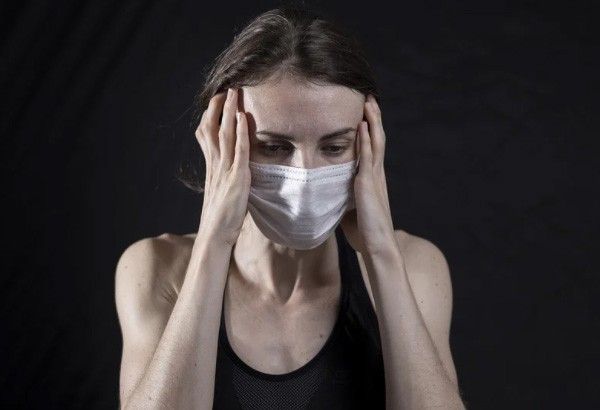COVID, CVD, neurology: New studies show COVID-19's effects on heart, brain

MANILA, Philippines — Two studies conducted in 2020 revealed the link between stroke and COVID-19 patients in the Philippines.
In one of the restropective studies, 41 out of the 2,018 patients developed acute stroke. It found that the risk factors of the affected patients were lifestyle choices that include smoking (44 percent) and frequent alchohol intake (39 percent).
Neurologist and former president of the Stroke Society of the Philippines Dr. Maria Epifania Vasquez Collantes was part of the group that presented the study titled "Stroke in Patients with COVID-19 Infection in a Tertiary Hospital: A Retrospective Study."
Dr. Collantes was at a recent roundtable that discussed the link between stroke and COVID-19.
The study was done at the Philippine General Hospital, one of the designated COVID-19 centers in the country, from March 30 to October 30, 2020.
Apart from smoking and alcohol intake, the said study also found out that hypertension (76%) and dyslipidemia (39%) are also risk factors.
The Johns Hopkins Diabetes Information website described a person with dyslipidemia that has "abnormal levels of lipids -- such as cholesterol and triglycerides -- in their blood."
The study found that 42% with mild COVID infection still suffered from stroke while 29% with severe COVID cases had stroke. Stroke mortality of patients with COVID-19 is high at 59%.
In a similar study titled "COVID-19 outcomes of 10,881 patients: retrospective study of neurological symptoms and associated manifestations (Philippine CORONA Study)," stroke (3.37%) was among the most common complications in the sample study. The other common complication is encelopathy (5.72%), a damage or disease that affects the brain.
The study's key finding revealed that 26% of patients suffered from neurologic symptoms. These include headache (6%), altered smell or loss of sense of smell (5%), altered sensorium (4.4%), altered taste (3%), and muscle pains (2.3%).
The CORONA study was conducted nationwide involving 37 major hospitals or study sites in the Philippines from February to December 2020.
Risk factors
The Mayo Clinic refers to stroke as an incident that occurs when the blood flow to an area is cut off. The brain cells are deprived of oxgen that will lead to cell death. As a result, the abilities controlled by the area of the brain will lose their function.
Out of the two kinds of strokes, Ischemic Stroke accounts for 80% of all strokes that occur. This type occurs when the brain's blood supply is blocked. The other type is Hemorrhagic Stroke that occurs when a leak or rapture in the brain's blood vessel occurs.
The Mayo Clinic has grouped into three the risk factors for stroke. These are:
- lifestyle (overweight, inactive, cigarette smoking, alcohol intake),
- medical (high blood pressure, diabetes, high cholesterol, history of cardiovascular diseases),
- and age- and gender-specific (people aged 55 and up and males).
Take note of 'Be Fast' and the 'Golden Hour'
A sense of urgency and time is an essential part in mitigating the long-term effects of stroke.
People are called to remember the acronym, BE FAST. This stands for:
B - Balance difficulty
E - Eye changes
F - Face drooping, crooked smile
A - Arm weak or numb
S - Slurred speech
T - Time to call the ambulance and go to the hospital
The Mayo Clinic also stressed the importance of knowing the "Golden Hour" or 60 minutes -- the time it will take to lessen the severe impact of stroke, which could include death and disability. Within this window, it is ideal that the person suffering through stroke will immediately receive treatment following the onset of its symptoms.
Serious health concern
The American Heart Association reported that 17 million people worldwide suffer from stroke every year, 1/3 die while the other 1/3 is left permanently disabled.
The Global Burden Disease data from the Institute of Health Metrics showed that stroke is the second leading cause of death and one of the top five leading causes of disability in the Philippines from 2009 to 2019. Data from the Philippine Statistics Authority showed similar result that stated that cerebrovascular diseases, which include stroke, is the third leading cause of death among Filipinos in 2020.
Stroke-ready hospitals
With the urgent nature of the disease, the availability of stroke-ready hospitals across the country is key. Several initiatives have been undertaken to address this pressing concern.
The Angels Initiative, for instance, was launched by Boehringer Ingelheim and was endorsed by the European Stroke Organization and World Stroke Organization. The global initiative aims to increase the number of acute stroke centers and stroke-ready hospitals and optimize the quality of treatment in existing stroke centers.
In the Philippines, the Angels Initiative began in 2017. It currently has four Angels consultants and 48 hospitals across the country in active consultation. The Angels Initiative is working with the Stroke Society of the Philippines and the Philippine Neurological Association. For an updated list of stroke-ready hospitals and medical facilities, go to https://www.strokesocietyphilippines.org/.



















